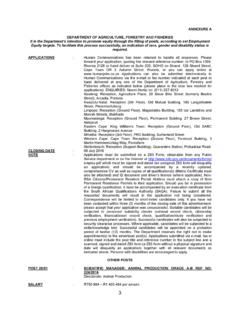Transcription of PhD THESIS WORK SUMMARY Entrepreneurial …
1 1 PhD Program in Business Administration PhD THESIS work SUMMARY Entrepreneurial management in hungarian SMEs by Lilla Hortov nyi Supervisor: Prof. K roly Balaton, DSc Budapest, 2009 2 Department of Strategic management PhD THESIS work SUMMARY Entrepreneurial management in hungarian SMEs by Lilla Hortov nyi Supervisor: Prof. K roly Balaton, DSc Lilla Hortov nyi 3 Table of contents 1. The choice of topic and justification of the central research question .. 5 2. Review of the literature and relevance of the research .. 6 3. Review of Entrepreneurial management research .. 10 4. Hypotheses development on Entrepreneurial management practices .. 14 5. Research design .. 17 Data collection.
2 18 Testing the data .. 19 6. Findings .. 20 7. Scholarly and managerial implications .. 24 8. References .. 26 4 5 1. The choice of topic and justification of the central research question I started my PhD studies in September 2002 on the PhD Program of Corvinus University of Budapest (formally known as Budapest University of Economic Science and Public Administration), specializing in the field of strategic management under the supervision of Professor K roly Balaton, DSc. From the very beginning, I was interested in studying the strategic renewal capabilities of organizations exhibiting innovative market behaviors from the point of view of management . My initial focus was refined first during the course of my PhD studies in Hungary and abroad, and second as I have progressed in elaborating the pertinent literature.
3 My THESIS thus focuses on the strategic behavior of managers in small- and medium-sized organizations with the aim of studying the phenomenon of Entrepreneurial management in organizational settings. The underlying assumption of my dissertation is that strategy is a pattern in a streams of actions, whether intended or not. In spite of the great variance in these behaviors, a few consistent patterns can be identified. With the appropriate use of taxonomy formation, however, these patterns in behavior can be classified into a few easily separable types of business-level strategies (for more details see Antal-Mokos and Kov cs, 1998; Hortov nyi and Szab , 2006; Miles and Snow, 1978). Taxonomies supported by empirical studies not only expose the generic strategies but, at the same time, explain differences in management and organizational processes (Ucbasaran et al.)
4 , 2001). Entrepreneurial management is assumed to be one of such behavioral patterns (a latent strategy). The main goal of my research is to identify and analyze thoroughly the phenomenon of the Entrepreneurial management process. In order to reach this goal, I have embedded my research in a broader context for systematically mapping the roots of entrepreneurship. After summarizing the literature review, I position my research in the cross-section of individual and process studies, namely, what empirical evidence is provided by managers of hungarian SMEs that could help us to understand the phenomenon of Entrepreneurial management and what can we learn from the behavior of Entrepreneurial managers that may be utilized in professional management ?
5 6 Focusing closely on the practice of Entrepreneurial management , I have revised Timmons s model (1994) and derived my hypotheses upon the suggested new model. I have also incorporated the critiques of previous studies and identified a novel research methodology multidimensional scaling for revealing the latent strategies and identifying taxonomies. Entrepreneurial managers are identified on the level of their Entrepreneurial orientation. My hypotheses are tested by cross-tabulation and Pearson correlation. My results have revealed that there are two new, formerly hidden dimensions opposed to Entrepreneurial orientation: speculation orientation and product push orientation . By distinguishing Entrepreneurial orientation from these dimensions I believe the verification of my hypotheses is improved.
6 Finally, the interpretation of my results provides useful insights for managers and policy-makers as well as researchers. In addition, I also identify new research questions for future, follow-up research. 2. Review of the literature and relevance of the research The nineteenth century is characterized by the emergence of industrial society. In a period of conjecture, entrepreneurs were able to accumulate wealth and displace aristocrats by recognizing more and more market discrepancies and kinds of opportunities. Joseph Schumpeter s (1885-1950) thoughts were born in such an economic and social milieu. With respect to the development of corporate entrepreneurship theory, Schumpeter s contribution had three important merits.
7 First, Schumpeter describes entrepreneurs as visionary change management agents (Sandberg, 1992) who introduce new economic activity that leads to a change in the market. From Schumpeter s point of view, an entrepreneur is not necessarily the one who puts up the initial capital or invents new products, but a person with a business idea. Consequently, the creative activity of the entrepreneur is independent of the organizational or legal setting in which he/she may work . The entrepreneur can also be a manager employed by the established organization. The inclusion of long-lasting market impact is what distinguishes entrepreneurs from business founders or small business owners. Second, entrepreneurship is not a profession and, in general, it is not a long-lasting state.
8 Whatever the entrepreneur is doing as a salesman or a software manufacturer etc. he or 7 she remains an entrepreneur as long he/she actually links a market problem with innovation. An entrepreneur loses his/her Entrepreneurial character when, after having exploited his/her business idea, he/she shifts to a business as usual activity (Schumpeter, 1980). In line with the growth of the organization, processes and organizational structures evolve. The organizational functions gradually take over a part of the founder s tasks as well as decision-making responsibilities being delegated to the employees. In this way, the enterprise starts a life of its own , and becomes separated from its founder relatively early (Dob k, 1999). Third, Schumpeter portrayed entrepreneurship as making a difference.
9 The entrepreneur breaks up with established practice and destroys the status quo while moving the market forward (Mintzberg at al., 1998:125). Instead of learning how to swim with the tide, he wants to change its course. In order to do that he must swim against the tide; what was previously a supporting factor is now turned now into an obstacle, so it must be destroyed. However, this is a creative destruction; after all, the entrepreneur induces qualitative advancement by creating new combinations of resources and introducing new products and new business models. Even if the entrepreneur is not successful in all cases, some of his successors eventually succeed in finding a viable business model; in such cases, the process results in long-lasting development of the market (Christensen, 2003).
10 In the end, entrepreneurship results in changes; if there are no changes, the activity does not qualify as entrepreneurship (Davidsson, 2003:318). Change is a necessary but not sufficient precondition of change, argues Davidsson (2003:321). According to Davidsson it is the market-related activity that may eventually result in entrepreneurship. Therefore, organizational change itself does not constitute entrepreneurship. In practice, improvement opportunities are hidden in the system immanently in the form of unused resources, cheaper raw materials, or even as unutilized production capacities etc. As a result, Entrepreneurial activities reveal to the market what the market did not realize was available; after all, this is how the market advances.









